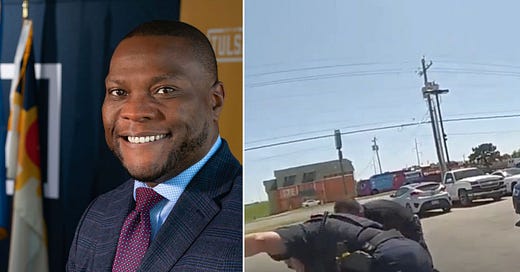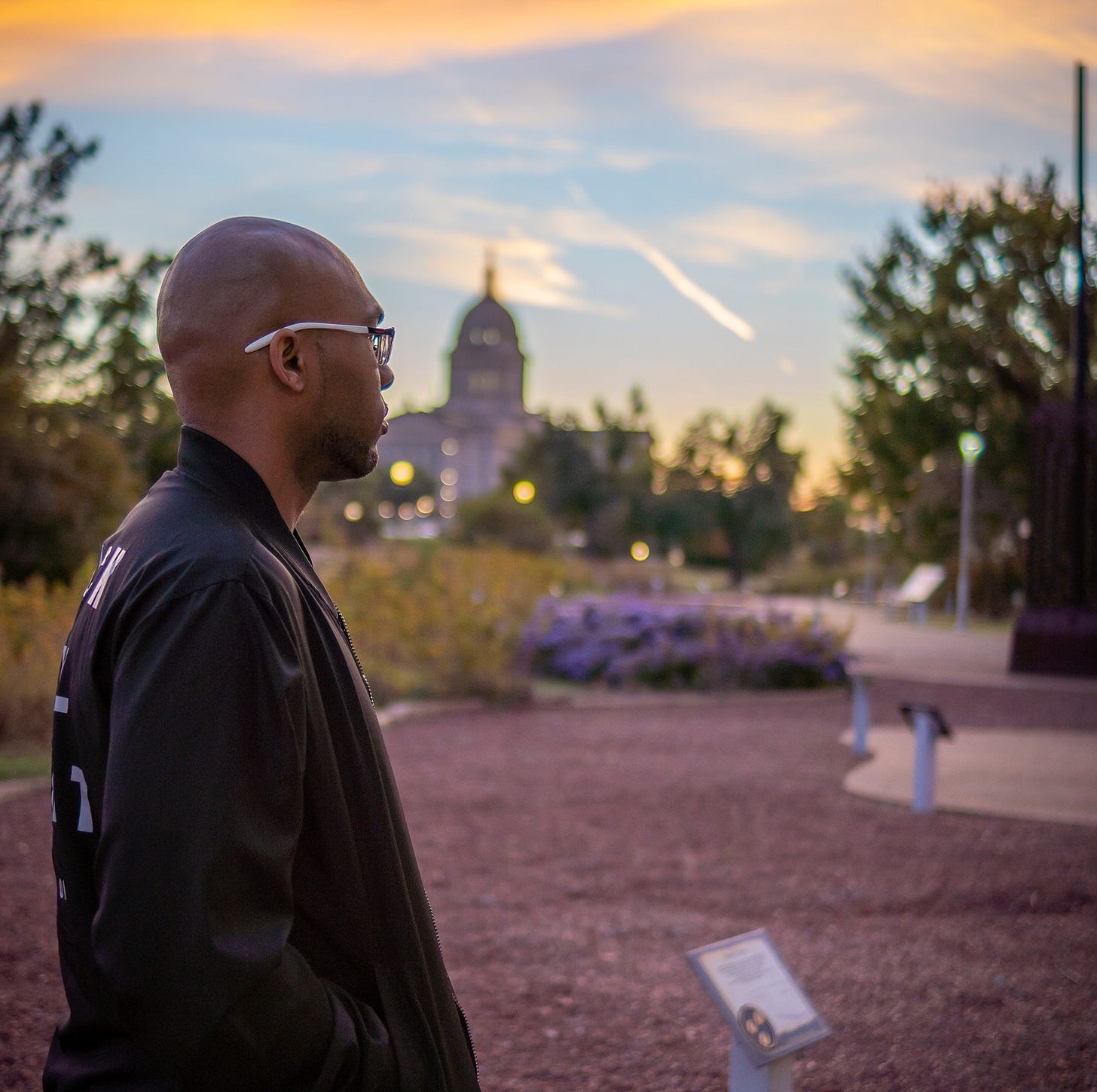Tulsa Police ran over a man. I asked the mayor what he's going to do about it
After Tulsa Police Department blamed the community for its violent response to a jaywalking arrest, Tulsa Mayor's Office tells me they've joined an internal review into the incident.
Last month, KJRH reporter Erin Christy published body cam footage that shows what should’ve been impossible to defend: Tulsa police ran over a man during an arrest for jaywalking. And they kept cuffing him afterward.
The man, 24-year-old Kemonte Hampton, can be heard crying out, “Y’all just ran me over, bro.” He had just surrendered. He was kneeling. A second officer shoved him to the ground. Then a patrol car — left in reverse — rolled over his body.
It was Christy’s report that got the footage out. All I did was follow up by pressing City Hall for their response.
And now, in response to my questioning and reporting for The Black Wall Street Times, the mayor’s office says they’ve formally joined the Tulsa Police Department’s internal review of the incident.
“Immediately following the incident, an internal review was launched, and I will be engaged in the review at the direction of Mayor Nichols,” stated the mayor’s Public Safety Commissioner Laurel Roberts.
That’s a step. But what happens from here — who’s involved, what decisions get made, whether anyone is held accountable — still feels entirely unclear. Meanwhile, Tulsa County prosecutors are moving forward with an October 20 trial against Hampton, who faces charges of jaywalking, resisting arrest, and obstructing justice.

What we know (and don’t) about the city’s role
Here’s the official statement from Public Safety Commissioner Laurel Roberts, sent to me:
“As with any police incident, we must affirm our commitment to transparency and accountability. Immediately following the incident, an internal review was launched, and I will be engaged in the review at the direction of Mayor Nichols. Our police officers are entrusted with protecting the public, and that trust will be upheld through integrity and respect for all members of our community.”
What the statement didn’t include was a timeline, names of officers involved, or any potential policy changes. As the first Black mayor in a city still reckoning with one of the worst instances of government-sanctioned racial domestic terror (1921 Tulsa Race Massacre), Monroe Nichols has an incredible task of maintaining the trust of all parts of the city while pushing progressive policies that transform the culture.
That doesn’t change the fact that it’s his responsibility to seek justice and to hold those who commit injustices accountable.
And if you've followed Tulsa policing like I have — years of reporting on one of the deadliest departments in the country according to Mapping Police Violence — then you already know how these reviews tend to play out: privately, quietly, and rarely with any consequence.
Tulsa has been ranked the fourth deadliest police department per one million residents between 2013 and 2025, data shows. Reversing that morbid statistic is just as important as repairing the Black Tulsa community. You can’t have one without the other.
TPD blamed the community. The mayor hasn’t said much more.
When KJRH asked Captain Richard Meulenberg to explain what happened, he actually appeared to blame the community for his officers’ violently reckless and negligent response.
“Is jaywalking a minor infraction? Yes,” the TPD captain admitted. “But it comes on the demands of the community saying, ‘Hey, we have major crimes out here—do something.’”
So here we are again: Tulsa police say they're simply responding to fear.
But what’s actually changed about the way they operate? What rules are they following that let a man get run over and still end up in cuffs?
We don’t know. And TPD won’t say.
Nichols’ election didn’t rewrite the culture
Mayor Monroe Nichols was elected last year — Tulsa’s first Black mayor.
He’s the son of a police officer. He’s spoken about reform. He’s acknowledged the trauma Black Tulsans carry when it comes to law enforcement.
But this is his test now.
And while it’s meaningful that his office has entered the conversation, it’s not clear yet that anything about the culture or outcomes will shift.
The officer who left the car in reverse? “Under review.”
Hampton’s charges — jaywalking, obstruction, resisting arrest? Still on the books.
Any policy changes? None announced.
This case — like so many others before it — isn’t just about what happened.
It’s about what we do with it once the public sees it.
I’ll keep asking questions, but I need your help.
My north star, famous Black journalist and NAACP co-founder Ida B. Wells, once said, “The way to right wrongs is to shine the light of truth upon them.” That’s all I’m trying to do. Oklahoma is the battleground for so many national battles, and I need your help to tell these stories. A single subscription could be the difference between silence being shaken and action being taken.
In Solidarity,
Deon Osborne
If you believe in the power of citizen voices, grassroots democracy, and storytelling from the Black experience and beyond, help us keep building on a platform that can’t be banned or bought.
☕ Grab a mug or some merch and rep the movement:
🎥 Donate directly to our documentary initiative to help me educate Oklahomans and the nation about our real history to empower a better future, proudly sponsored by The Third Space Foundation (tax-deductible):
Every contribution helps us preserve our history, empower our future, and tell the stories only we can tell. Thank you for being part of this journey.







